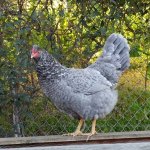Hen-Gen
Well-known member
Such are the long silences on this forum that I find myself scratching around for anything to say just to elicit a response. What’s occurring? Has everyone migrated to Facebook? There was a time when Practical Poultry was alive with information and argument, in fact some that ended in suspension of membership.
Anyhow. My main breeding pen for the coming Spring has two Dominique hens and a Dominique cockerel. He is actually the nephew of the hens. I hope that this won’t create problems. I hatched some Cream Legbars, from eBay, this year that were beset with twisted feet that I attribute to inbreeding. I’ve learnt over the years with Cairn Terriers, Weimaraners and Gloster Canaries that inbreeding is a tool to be used sparingly.
Anyway in with the afore mentioned breeding trio is a Blue Jersey Giant. This could potentially yield some Blue Barred offspring. This is a colour variety that is not acceptable in any breed of chicken. And yet a google image search shows that this can be very attractive indeed. But last year she went broody in March and subsequently proved herself to be the most persistent broody I have ever owned. Hopefully this year I’ll get 6 to 8 eggs for hatching. Underneath her slate coloured legs is yellow skin. So hopefully the addition of the barring gene, which removes dark pigment, will give chicks with yellow legs.
Having said that, it has been my experience over the years that the theories on the inheritance of chicken plumage colour are only generalised and should come with caveats about exceptions when other genes are present.
It has to be said though that the genetics of livestock breeding has been an enduring and fascinating passion. In fact it is one of the defining things of my life. It’s probably a good thing that I have no children or I’d have strayed into some very dodgy areas of eugenics.
As a subscriber to New Scientist I am aware that we are on the cusp of some very important discoveries that have the potential to remove all heritable diseases from our species. Some fear this “brave new world”. I anticipate it with excitement. One famous scientist was recently asked what he thought was the single most important discovery in recent years. He replied gene editing.
So lots of points to stimulate discussion. Bring it on!
Anyhow. My main breeding pen for the coming Spring has two Dominique hens and a Dominique cockerel. He is actually the nephew of the hens. I hope that this won’t create problems. I hatched some Cream Legbars, from eBay, this year that were beset with twisted feet that I attribute to inbreeding. I’ve learnt over the years with Cairn Terriers, Weimaraners and Gloster Canaries that inbreeding is a tool to be used sparingly.
Anyway in with the afore mentioned breeding trio is a Blue Jersey Giant. This could potentially yield some Blue Barred offspring. This is a colour variety that is not acceptable in any breed of chicken. And yet a google image search shows that this can be very attractive indeed. But last year she went broody in March and subsequently proved herself to be the most persistent broody I have ever owned. Hopefully this year I’ll get 6 to 8 eggs for hatching. Underneath her slate coloured legs is yellow skin. So hopefully the addition of the barring gene, which removes dark pigment, will give chicks with yellow legs.
Having said that, it has been my experience over the years that the theories on the inheritance of chicken plumage colour are only generalised and should come with caveats about exceptions when other genes are present.
It has to be said though that the genetics of livestock breeding has been an enduring and fascinating passion. In fact it is one of the defining things of my life. It’s probably a good thing that I have no children or I’d have strayed into some very dodgy areas of eugenics.
As a subscriber to New Scientist I am aware that we are on the cusp of some very important discoveries that have the potential to remove all heritable diseases from our species. Some fear this “brave new world”. I anticipate it with excitement. One famous scientist was recently asked what he thought was the single most important discovery in recent years. He replied gene editing.
So lots of points to stimulate discussion. Bring it on!

